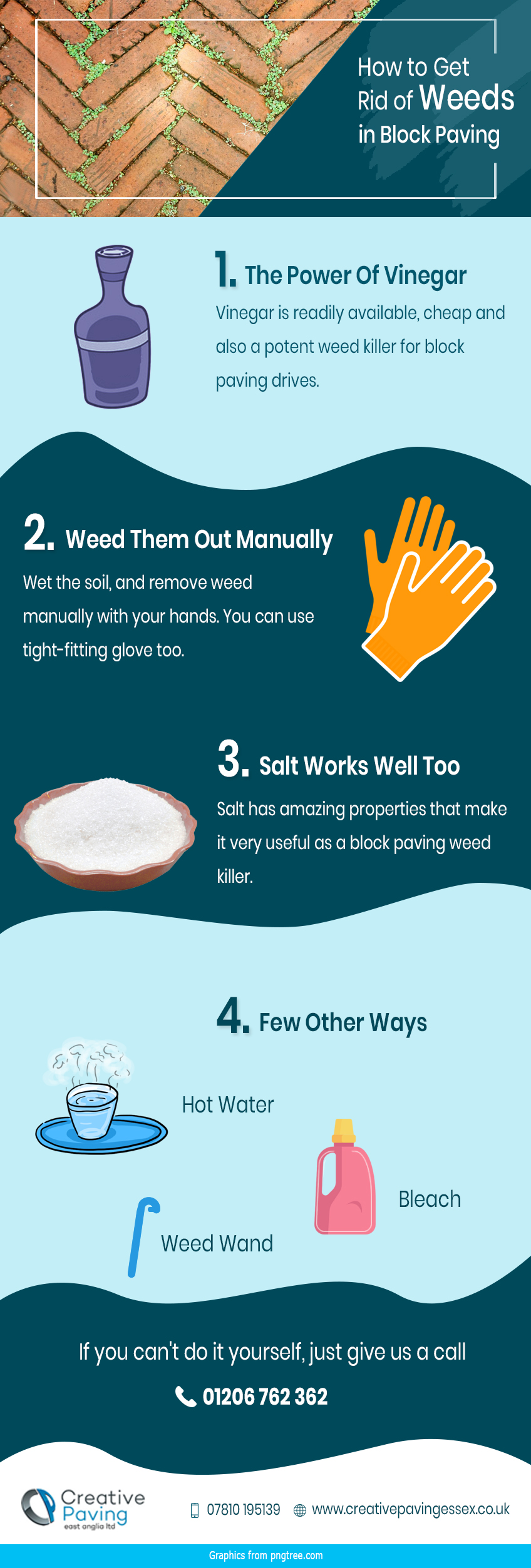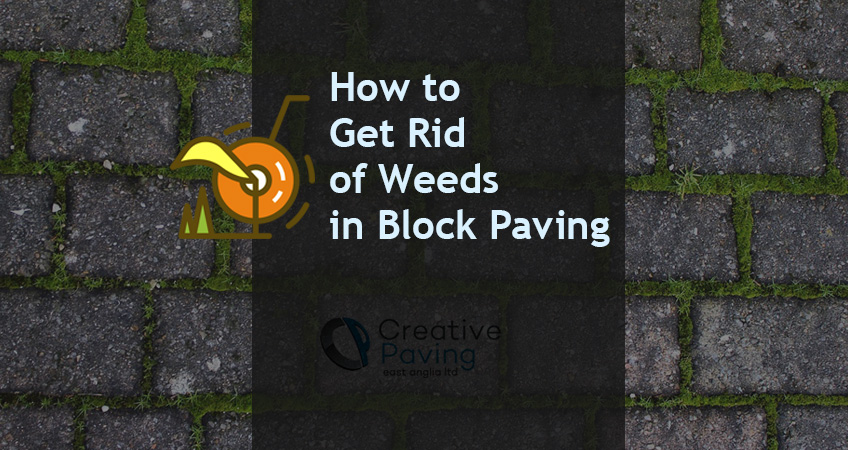A neat block paving is always a beautiful sight to behold. Unfortunately, without proper maintenance or neglect, your block paving may get infested with weed. Some of them have seeds that are transported by the wind and may land in cracks. Those terrible weeds stand out in your block paving and make it look hideous. Moss, algae and dandelion can also fill up your block paving. Dont worry, in this post, you will learn about the best moss and weed killers for block paving.
The Power Of Vinegar
Among the best moss and weed killers for block paving, vinegar stands out. Vinegar is readily available, cheap and also a potent weed killer for block paving drives. Vinegar which contains acetic acids has the same modus operandi as salt. It dries out weed on contact. You can choose between using pickling vinegar, which has a 7% concentration, or you can use vinegar with a concentration of about 10-15% for a more devastating weed-killing effect. To achieve this concentration, you must dilute horticulture vinegar with the appropriate amount of water. And the vinegar should be applied directly to the leaves of the target weeds.
Vinegar doesn’t take as much time as the salt solution, and you can see results in less than a day. You can use a spray bottle or a garden sprayer to apply it. It’s best to apply it on a sunny day so the weed will dry out faster. Mixing vinegar with salt and a soapy solution reduces the surface tension and makes the concoction more readily absorbed into the leaves.
Block Paving Essex – Call: 01206 762 362
Employing vinegar may seem like the best weed killer for your block paving, but as always, your safety should be your number one priority. When dealing with vinegar at concentrations such as these, you should take some measures. Use gloves to prevent burns on your skin. The fumes are toxic and can negatively affect sensitive parts of the body. Make sure to wear protective eye gear and a face mask.
Weed Them Out Manually
Before removing the weed manually, wet the soil. This will make the work slightly more comfortable for you. Of course, you could use your hands to remove the weeds, but this can cause some bruising on your hand with some weeds. To prevent injuries or scratches, you should take caution. Use a tight-fitting glove to keep your hands clean and not get contaminated.
Why not be as comfortable as possible when working? Use knee pads because you may have to bend for a long time (depending on how much weed is in your block paving) the knee pads will save you from soiling your clothes and knee injuries. You need to right tools for the job. Use a crack weeder or a billhook to remove weed from wider cracks and a serrated knife for those hard-to-remove ones in narrow crevices.
Salt Works Well Too
You might be surprised to see salt on this list. Salt has amazing properties that make it very useful as a block paving weed killer. Salts are hygroscopic. It means they absorb moisture from the environment they are kept in. Common household substances such as baking soda (sodium bicarbonate) and sodium chloride excel at this. They gradually draw out the water from the plant tissues and kill them.
To do this, you only need to create a salt solution. Mix one part of baking soda or sodium chloride to three parts of water for an effective solution. Use a funnel to direct your weed killer directly on the weed to get the most out of it. You can increase the concentration of the solution if you are not getting your desired result fast enough.
Do not let the salt solution get into your eyes, or it will cause severe irritation. You should also be cautious so as not to damage surrounding vegetation unintentionally.
Few Other Ways
There are few other ways to make block paving weed killers. Let’s quickly go through them:
-
Hot Water
Using hot water as a weed killer for block paving drives sounds unconventional, but it is very useful. Instead of pouring the spent water after boiling some potatoes or eggs down the drain, why not pour it on those stubborn weeds. It takes only a few minutes for you to see the effects. As always, be well protected when handling hot water.
-
Bleach
Bleach is also a good moss and weed killer for your block paving. Clean and clear out the area you wish to work on and wet it. Apply a 5:1 water-bleach mixture and brush all over the surface and leave for 15 minutes. Afterward, rinse the area with clean water. You should see some improvement after this application. Be safe when working with bleach. Too many applications may discolour your paving.
-
Weed wand
A weed wand!? It sounds like something from a fairy tale. As magical as it sounds, it is an excellent tool to employ if you quickly need to get rid of those unsightly weeds. The weed wand is more or less a handheld blowtorch thats fueled by butane. Its long handle makes it easy to burn the weed through the cracks and completely wipe them from the face of the earth (block paving).
In Conclusion
After finally getting rid of all the moss and weed in your block paving, you should do everything in your power to ensure they dont return. It is important always to keep your block paving clean to prevent regrowth. Regularly brushing your paving prevents the buildup of dirt and soil. Sealing your block paving also prevents weeds from growing in cracks.
Youll need to contact professionals who will seal your block paving perfectly, and adding more years to its effective lifespan.
Creative Paving provides the best block paving sealing In the UK. Our experience of over 22 years in the business ensures we satisfy all our clients’ needs to the maximum every time. Asides block pavings; we also install resin-bound driveways. With resin drives, you won’t have to worry about any troublesome weeds. Find out more about the services we offer here.
Read also:


